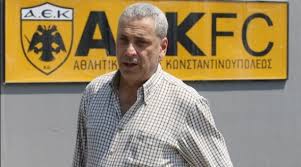By Mark Baber
March 22 – AEK Athens president Andreas Dimitrelos (pictured) has been arrested over €170 million in taxes owed by the Greek top flight club.
Dimitrelos was arrested by the Attica Police Directorate’s Financial Inspection Division after surrendering voluntarily and a statement was issued saying: “A 54-year-old Greek was arrested today (21-3-2013) morning, as CEO of a Societe Anonyme, for non-payment of debts towards the public, overall cost up to €170.865.122,00.”
Dimitrelos will be questioned by the Prosecutor of Athens First Instance Court today.
Warrants have also been issued, by Athens public prosecutor Grigoris Peponis, for the arrest of the club’s presidents from 2004 to October 2012, including Demis Nikolaidis, Giorgos Kintis, Nikos Thanopoulos and Stavros Adamidis.
AEK issued a statement saying: “The voluntary attendance of our president Andreas Dimitrelos at police headquarters concerns club debts from previous administrations which have been restructured by Article 44 (of the bankruptcy code) and for which the present administration is not liable as they have not arisen out of the current fiscal year.
“On the contrary, up to this point Mr Dimitrelos has managed to keep AEK Athens alive, so much so that we are all united in the hope for our final victory and salvation.”
The high debt figure in the police statement includes debts incurred prior to AEK’s Article 44 bankruptcy, with the club apparently unable to pay the predicted amounts to discharge the debt.
The 11-times Greek champions sold most of their players last year and are now operating on a shoe-string budget in a bid to retain their top flight status, after already having been excluded from Europe.
With Greece suffering economic collapse, its football clubs are being hit by a perfect storm of shrinking budgets, slumping salaries and falling attendances. Aris Saloniki, OFI Crete, Panionios Athens, PAS Giannena, AO Kerkyra have all fallen foul of financial fairplay regulations. According to FIFPro, about two out of three professional soccer players in Greece do not receive their salaries on time.
Whilst top-flight teams are facing massive declines in their fortunes, lower division teams have been even harder hit, having already lost income from the state lottery over fan violence.
The only ray of hope in this dismal vista is a renewed focus on developing young, home-grown talent, with most of the high-earners and foreign stars having left for other leagues.
Contact the writer of this story at moc.l1744751098labto1744751098ofdlr1744751098owedi1744751098sni@r1744751098ebab.1744751098kram1744751098

